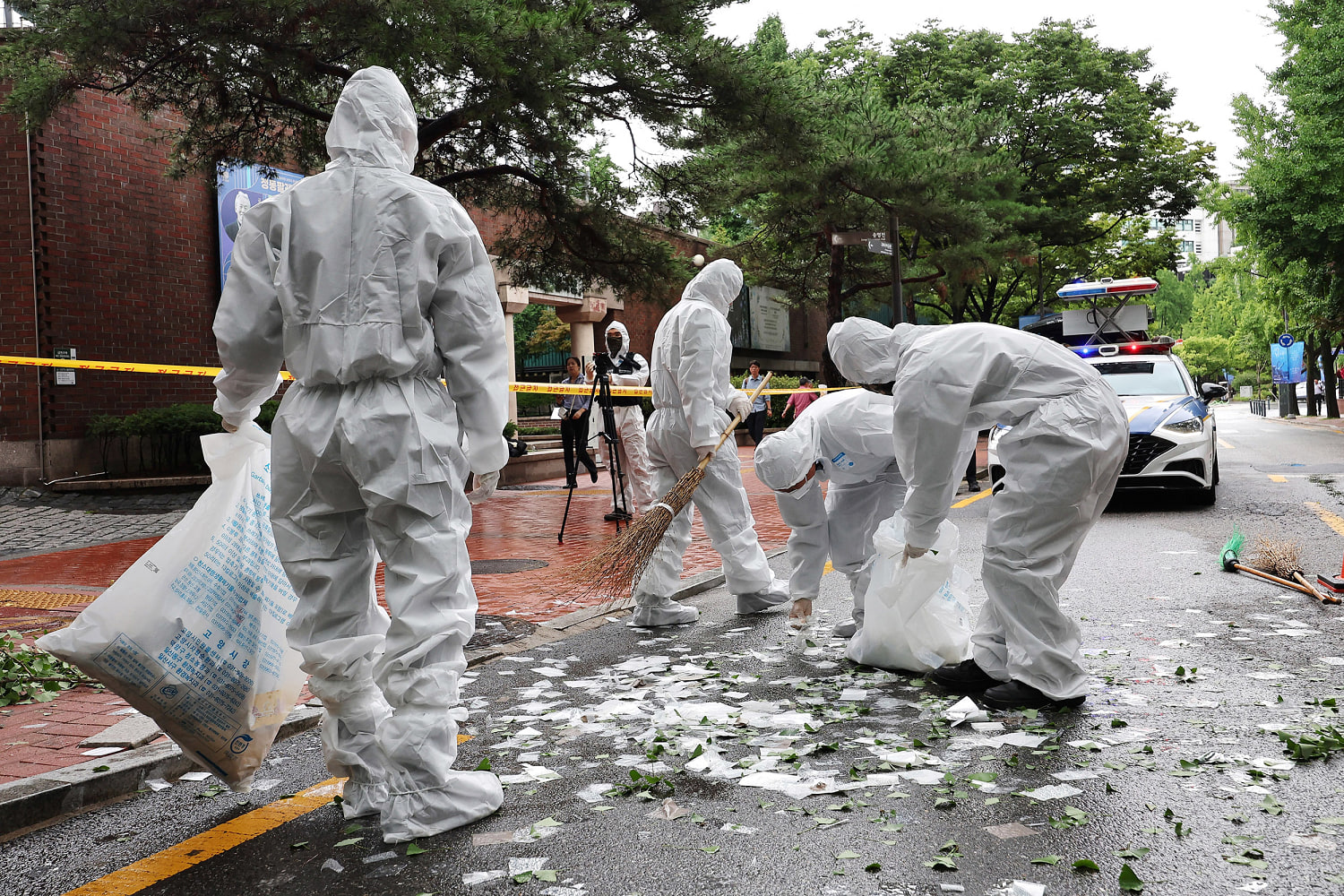North Korean trash balloon lands on South Korea’s presidential compound

It’s not the cross-border barrage South Koreans have been fearing, but a trash filled balloon floated over from North Korea and hit the presidential compound, security officials said Wednesday.
Seoul’s Presidential Security Service said in a statement that it had tracked the balloon in real-time as it was carried by the winds across its nuclear-armed neighbor‘s border, until it eventually landed in the the presidential compound in the South Korean capital.
It posed no danger, the agency added.
Balloons emerged as a new and messy weapon of war earlier this year. Since May, North Korea has been floating thousands of balloons with bags of trash attached to them, which have become a new source of tension between the two Koreas. Some have been filled with bottles, old batteries and even manure.
Pyongyang has said the launches are a tit-for-tat response to activists and defectors who have for years sent propaganda leaflets via balloons.
South Korea’s military is “closely monitoring North Korean movements,” the country’s Defense Minister Shin Won-sik told the Japanese newspaper Yomiuiri in an interview published Wednesday.
He added that it was possible that North Korea’s “military could fire at the balloons being sent by South Korean activists or the source where the balloons are launched.”
However, the likelihood of Pyongyang’s military detecting the exact time and location of the South Korean balloons was low, the defense ministry told NBC News.
North Korea floated another round of balloons on Sunday, which South Korea called vulgar and shameful. It responded by blaring K-Pop through loudspeakers across the border.
“We are broadcasting K-Pop, happy lifestyle [in South Korea], the development of South Korea and so on through the loudspeaker to North Korea,” Seoul’s Joint Chiefs of Staff said in a briefing Tuesday.
The broadcasts were the first of its kind in more than a month and previously have included K-pop songs, weather forecasts, news on Samsung, the biggest South Korean company, as well criticism of the North Korean missile program.
Although the balloon landed away from the main presidential office, it was the first one to have landed in the presidential compound, raising security concerns about key buildings. Officials did not say whether the balloon was manually guided, but the presidential service said it was carried by westerly winds.
South Korea has warned people to refrain from touching the objects contained in the trash bags.
Shin, South Korea’s defense minister, said Pyongyang “may also respond by burying land mines, dissemination of propaganda leaflets using drones, disruption of the GPS, cyber-attack and so on.”
His comments came as Belarusian Foreign Minister Maxim Ryzhenkov arrived in the North Korean capital on Tuesday.
Both countries are allies of Russia, which has become more diplomatically isolated since launching an invasion on Ukraine two years ago.
North Korea is keen to boost ties with Belarus to “open a new era,” state media KCNA quoted Foreign Minister Choe Son Hui as saying Wednesday a day after their meeting.
His visit comes after Russian President Vladimir Putin made a rare state visit to Kim last month, where the two signed a mutual defense treaty.
Tensions between the Koreas have been escalating for months, with Kim accelerating weapons testing and North Korean soldiers repeatedly crossing the border briefly that have prompted warning shots.
Earlier this month, North Korean President Kim Jong Un’s sister, Kim Yo Jang blasted South Korea for “dirty leaflets” that were found in the border and other areas of North Korea, hinting on the eventual resumption of balloon launches.
Satellite imagery has also shown North Korea building a wall-like structure along portions of the North Korean side of the demarcation zone (DMZ), which is a 2.5 miles thick buffer zone, half on each side of the border line.
South Korea resumed aerial surveillance near the border and nullified parts of the 2018 military accords, which it said was in retaliation for North Korea’s satellite launch in November.
Kim later suspended the accords altogether, restored border guard posts and began sending his latest propaganda weapon, trash-filled balloons.





